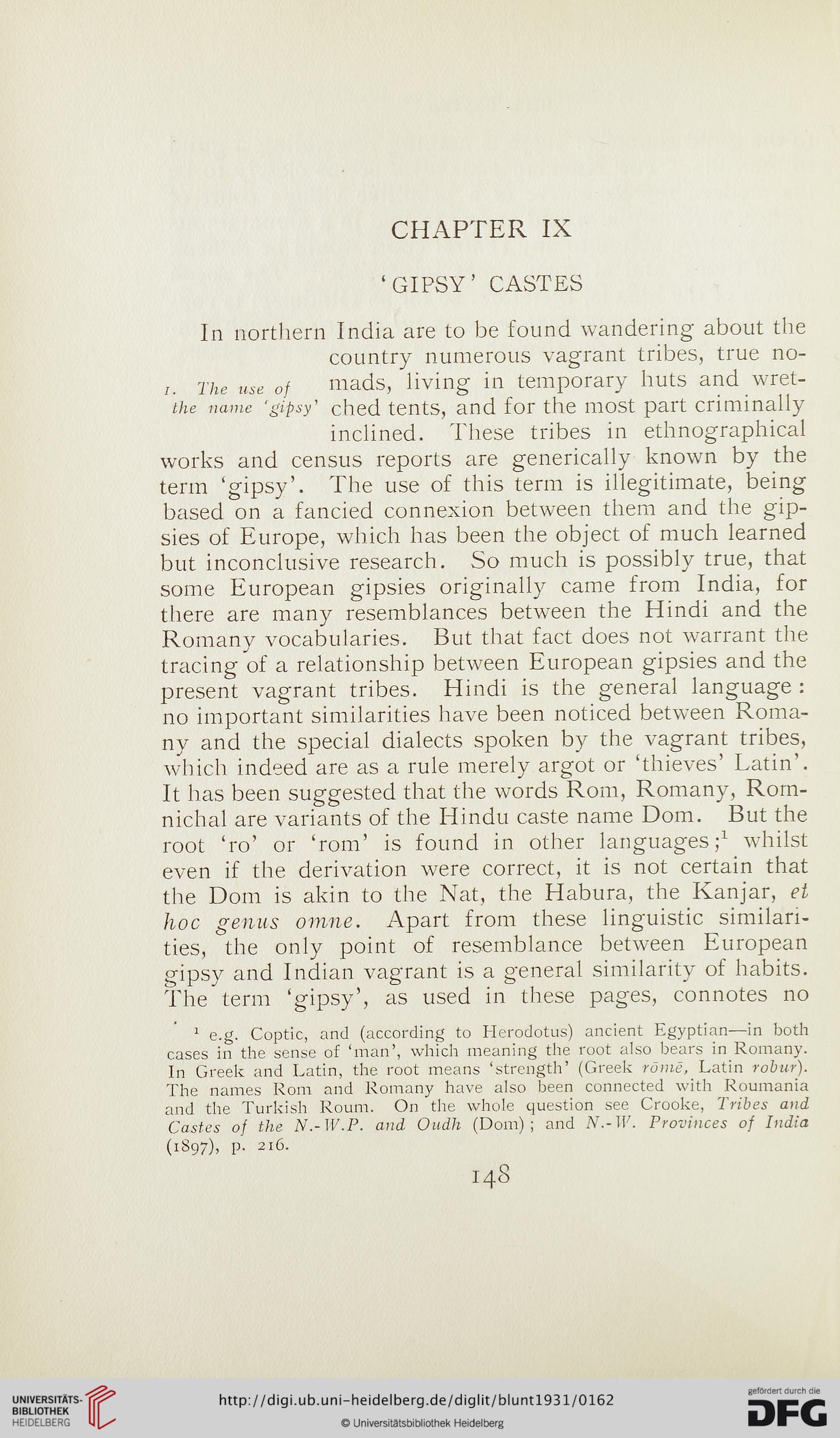CHAPTER IX
‘ GIPSY ’ CASTES
In northern India are to be found wandering about the
country numerous vagrant tribes, true no-
i. The use of mads, living in temporary huts and wret-
the name 'gipsy' ched tents, and for the most part criminaliy
inclined. These tribes in ethnographical
works and census reports are generically known by the
term ‘gipsy’. The use of this term is illegitimate, being
based on a fancied connexion between thern and the gip-
sies of Europe, which has been the object of much learned
but inconclusive research. So much is possibly true, that
some European gipsies originally came from India, for
there are many resemblances between the Hindi and the
Romany vocabularies. But that fact does not warrant the
tracing of a relationship between European gipsies and the
present vagrant tribes. Hindi is the general language :
no important similarities have been noticed between Roma-
ny and the special dialects spoken by the vagrant tribes,
which indeed are as a rule merely argot or ‘thieves’ Latin’.
It has been suggested that the words Rom, Romany, Rom-
nichal are variants of the Hindu caste name Dom. But the
root ‘ro’ or ‘rom’ is found in other languages ;x whilst
even if the derivation were correct, it is not certain that
the Dom is akin to the Nat, the Habura, the Kanjar, et
hoc genus omne. Apart from these linguistic similari-
ties, the only point of resemblance between European
gipsy and Indian vagrant is a general similarity of habits.
The term ‘gipsy’, as used in these pages, connotes no
1 e.g. Coptic, and (according to Herodotus) ancient Egyptian—in both
cases in the sense of ‘man’, which meaning the root also bears in Romany.
In Greek and Latin, the root means ‘strength’ (Greek rome, Latin robur).
The names Rom and Romany have also been connected with Rouinania
and the Turkish Roum. On the whole question see Crooke, Tribes and
Castes of the N.-W.P. and Oudh (Dom) ; and Ah-T(/. Provinces of India
(iSg?), p. 216.
‘ GIPSY ’ CASTES
In northern India are to be found wandering about the
country numerous vagrant tribes, true no-
i. The use of mads, living in temporary huts and wret-
the name 'gipsy' ched tents, and for the most part criminaliy
inclined. These tribes in ethnographical
works and census reports are generically known by the
term ‘gipsy’. The use of this term is illegitimate, being
based on a fancied connexion between thern and the gip-
sies of Europe, which has been the object of much learned
but inconclusive research. So much is possibly true, that
some European gipsies originally came from India, for
there are many resemblances between the Hindi and the
Romany vocabularies. But that fact does not warrant the
tracing of a relationship between European gipsies and the
present vagrant tribes. Hindi is the general language :
no important similarities have been noticed between Roma-
ny and the special dialects spoken by the vagrant tribes,
which indeed are as a rule merely argot or ‘thieves’ Latin’.
It has been suggested that the words Rom, Romany, Rom-
nichal are variants of the Hindu caste name Dom. But the
root ‘ro’ or ‘rom’ is found in other languages ;x whilst
even if the derivation were correct, it is not certain that
the Dom is akin to the Nat, the Habura, the Kanjar, et
hoc genus omne. Apart from these linguistic similari-
ties, the only point of resemblance between European
gipsy and Indian vagrant is a general similarity of habits.
The term ‘gipsy’, as used in these pages, connotes no
1 e.g. Coptic, and (according to Herodotus) ancient Egyptian—in both
cases in the sense of ‘man’, which meaning the root also bears in Romany.
In Greek and Latin, the root means ‘strength’ (Greek rome, Latin robur).
The names Rom and Romany have also been connected with Rouinania
and the Turkish Roum. On the whole question see Crooke, Tribes and
Castes of the N.-W.P. and Oudh (Dom) ; and Ah-T(/. Provinces of India
(iSg?), p. 216.




